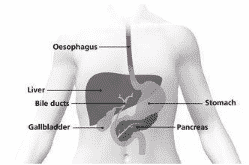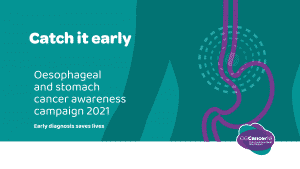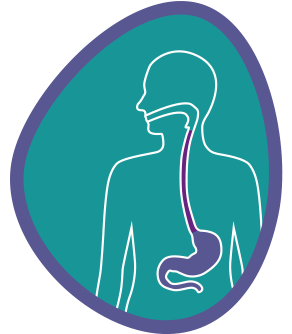What Is Oesophageal Cancer & What Are The Early Signs?
You may have heard about oesophageal cancer, but do you really know what it is?
Unfortunately, you’re going to be hearing a lot more about it over the next few years. That’s because it’s on the increase. In 2016, 226 people in Northern Ireland were diagnosed with oesophageal cancer.
Despite the increase in the incidence of the disease, however, most of us lack awareness of what oesophageal and the related gastric cancer actually are. Gastric cancer or stomach cancer is also on the increase – 214 were newly diagnosed with gastric cancer in 2016 – and the two are inextricably linked.
What it is
Oesophageal cancer is a cancer that’s found anywhere in the oesophagus – that’s your food pipe or gullet. Basically, it’s the long tube that carries food from your throat to your stomach.
Oesophageal cancer is a cancer that’s found anywhere in the oesophagus, sometimes called the gullet or food pipe.
The main problem with oesophageal cancer is the fact that the symptoms are often vague and may resemble symptoms of less serious conditions. As such, they’re often overlooked. This means that you may not actually see a GP for further investigation until the disease has progressed so far that treatment will prove futile.
As with most conditions, therefore, early diagnosis is vital and so it’s really important that you know the symptoms of oesophageal cancer and are able to recognise them at an early stage.

Pic: NHS
Symptoms
How serious oesophageal cancer is depends on where it is in the oesophagus, how big it is, if it has spread and your general health.
Early symptoms of oesophageal cancer include:
- Swallowing difficulties or a sensation of food sticking in your chest
- Pain or discomfort as food passes down the oesophagus
- Persistent heartburn/acid reflux (persistent would be two to three weeks without passing off)
- Persistent cough or hoarseness
- Persistent hiccups
- Regurgitation of food on a regular basis
- Persistent nausea/retching/heaving
- Unexpected weight loss/unusual tiredness
Who is likely to get oesophageal cancer?
While ANYONE can get oesophageal cancer, you’re more likely to get it if you’re:
- Over the age of 60
- Are male
- Have certain medical conditions, such as long-term, severe acid reflux or gastro-oesophageal reflux disease (GORD), or a condition called Barrett’s oesophagus, which is a condition in which tissues that is similar to the lining of the intestine replaces the tissue lining the oesophagus. People who have Barrett’s oesophagus are more likely to develop a type of cancer called oesophageal adenocarcinoma.
How do you get a diagnosis?
Your GP will carry out a physical exam and health history to check your general signs of health, and will check for signs of disease, such as lumps.
The doctor may initially give you a medication to see if that can solve your symptoms. If, after two to three weeks, your symptoms have not gone away, he/she may refer you for an endoscopy. This is a camera which is passed down your oesophagus (with sedation if you prefer) where the endoscopist can have a look at the lining of the oesophagus and the stomach. They may take biopsies if they are unhappy about anything they see. This does not necessarily mean you have cancer.
Depending on your GPs assessment they may also refer you for a CT Scan and/or a barium swallow which is a type of X-ray that allows the doctor to look at the back of your mouth and throat and oesophagus.
What happens at diagnosis?
When the results of the tests are all finally done and assessed, you will be called to see your consultant for the results. If the consultant tells you that you have cancer, you may not recall past that point in the consultation. We are often told that the rest of the appointment is a blur. It is a form of shock and quite understandable; that is why it is so important for you to take someone with you to important appointments. They will often hear things that you don’t. It is at this point that we like patients to hear about us. It is important to know that you are not alone and that we are there to support and help.
Treatment
If you do have oesophageal cancer, then it may be treatable, albeit that it can be difficult to treat.
The treatment you will have will depend on:
- the size and type of oesophageal cancer you have
- where it is
- if it has spread
- your general health
Treatment may include surgery, chemotherapy and radiotherapy, but you’ll have regular check-ups during and after any treatments.
Chemotherapy
This means that medicines will be used to kill cancer cells. It will help make the cancer smaller and may be followed by surgery to get rid of any remaining cancer and help stop the cancer coming back. On some occasions chemotherapy may be administered as well as radiotherapy as a treatment.
Radiotherapy
Radiotherapy uses high-energy rays of radiation to kill cancer cells. You will be advised to have radiotherapy for oesophageal cancer to:
- treat cancer, in some cases alongside with chemotherapy
- to help control and improve the symptoms of advanced cancer
Surgery
If oesophageal cancer is found early – and it has not spread – you may be able to have surgery to remove it.
Surgery will remove part or, in a small number of cases, most of the oesophagus. They may also need to remove parts of other organs around the oesophagus, such as the top of the stomach.

